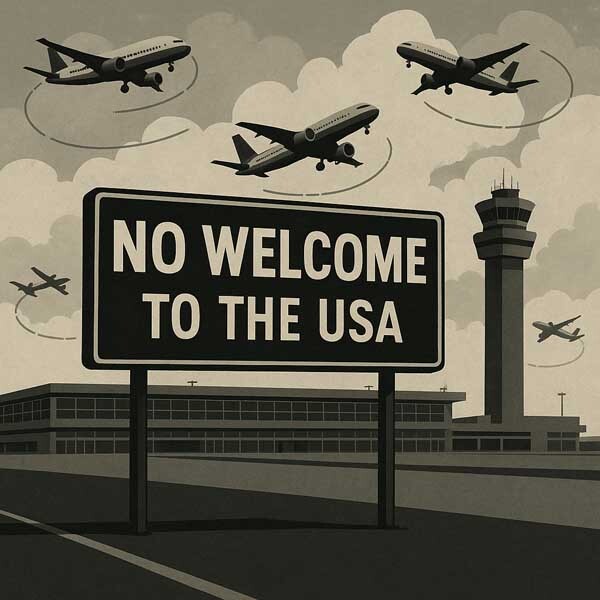 News Staff
News Staff![]() -
Apr 19 -
Business
travel
U.S. Department of Commerce’s
Tourism
-
648 views -
0 Comments -
0 Likes -
0 Reviews
-
Apr 19 -
Business
travel
U.S. Department of Commerce’s
Tourism
-
648 views -
0 Comments -
0 Likes -
0 Reviews

DLNews Travel:
"America’s Welcome Mat Rolls Up: Tourism Tanks Amid Border Jitters and Legal Crackdowns"
America’s tourism industry, once a gleaming pillar of soft power and economic strength, is now facing a sharp and sudden downturn—driven, experts say, by new federal policies under the Trump administration that appear increasingly unwelcoming to international visitors. The numbers tell a stark story: in March alone, foreign tourism dropped by nearly 12 percent compared to last year, with a jaw-dropping 28 percent plunge in visitors from Germany, according to the U.S. Department of Commerce’s International Trade Administration.
This is not a seasonal dip or a lingering COVID effect. It’s the first significant post-pandemic slide, raising red flags among economists and international trade analysts. “The tourism sector contributes over $1.9 trillion annually to the U.S. economy and supports nearly 9 million American jobs,” said Roger Dow, former CEO of the U.S. Travel Association. “To watch that start to erode due to perceived hostility at the border is not just bad optics—it’s bad business.”
At the heart of the issue are recent immigration and border enforcement measures that many see as overly aggressive, particularly toward tourists who have done everything right. Documented cases of German citizens being detained for hours or even days at U.S. ports of entry, despite valid visas and no criminal records, have gone viral across European media. Several were even transferred to deportation facilities before being released or sent home, sparking outrage and fear among prospective travelers.
The drop isn’t limited to Germany. The March data shows a 17 percent decline in travelers from Western Europe, a 24 percent dip from Central America, and an 11 percent slide from China. According to analysts from the Global Economic Institute, if these trends continue through the summer travel season, the U.S. could see losses exceeding $15 billion in tourism revenue this year alone.
U.S. Secretary of State Marco Rubio has attempted damage control, stating that tourists "not involved in Hamas demonstrations or planning unrest have nothing to fear." However, critics argue that his remarks miss the point. "This kind of statement implies guilt by association or ideology," said Berlin-based international law scholar Dr. Anika Reuter. "The legal ambiguity and the political tone deter law-abiding families from vacationing in the U.S."
On the world trade front, the slump is also undermining the U.S. image as an open-market leader. Global travel is part of a broader web of cultural and economic exchange, and the current chill is pushing travelers to reroute their dollars elsewhere, toward destinations perceived as safer, easier to enter, and more hospitable.
“Tourism is one of America’s most powerful exports,” said Jonathan Grella, a strategic advisor for the travel industry. “We are turning away not just revenue, but relationships, goodwill, and long-term partners in trade.”
As the world watches, and as other countries like Canada, Japan, and France lean into global tourism with streamlined policies and digital visa platforms, the U.S. faces a choice: continue doubling down on harsh entry tactics, or remember that a nation’s greatness is not just in its might—but in the way it welcomes the world.
The decline in tourism to the United States isn’t just an isolated crisis—it’s the fraying edge of a much larger economic tapestry. Tourism has always been more than plane tickets and hotel stays; it is intrinsically tied to international trade, diplomacy, and market perception. And when a country begins to lose favor with global travelers, it often sees a ripple effect across its trade relationships and investment opportunities.
“Trade and tourism move in parallel,” explains Dr. Clara Montrose, senior economist at the Brookings Institution. “When travelers stop visiting a country, they're not just avoiding its airports and theme parks—they’re removing themselves from its culture, business networks, and consumer markets.” According to Montrose, the image of America as a complex or risky destination directly affects investor confidence, contract negotiations, and business development tied to bilateral trade agreements.
This matters deeply because tourism is baked into dozens of international trade accords. The U.S. has long included provisions on travel, business visas, and cultural exchange in free trade agreements like NAFTA (now USMCA) and bilateral deals with the EU, Japan, and South Korea. Tourism flow fuels these deals by reinforcing trust and mutual benefit. When foreign citizens are detained at the border or face unpredictable treatment, it signals to their governments and businesses that the U.S. may no longer be a dependable or welcoming trade partner.
Germany, whose tourism drop was the most pronounced last month, is also one of America’s top EU trading partners, with bilateral trade exceeding $250 billion in 2023. A chilling effect on German travel could sour broader negotiations on regulatory harmonization, tariffs, and intellectual property frameworks, especially in sectors like automotive tech, pharmaceuticals, and green energy.
Worse still, the tightening of tourism under nationalist rhetoric can be perceived as a breach of the spirit of existing agreements, if not the letter. “We’re seeing a real diplomatic cost,” said Jean-Paul Delacourt, trade envoy for the European Commission. “When you talk about partnerships but treat our citizens like threats, it undermines everything else we’re trying to build together.”
Even emerging trade initiatives with Latin America and Southeast Asian countries are facing headwinds, as regional leaders raise concerns about U.S. visa denials and reports of mistreatment at customs. China, which saw an 11 percent drop in travelers to the U.S. in March, remains locked in tense trade negotiations with Washington, and the tourism slump only deepens the divide. Chinese state media have already discouraged students and families from visiting the U.S., calling it "a place of legal ambiguity and social unrest."
With trade and tourism so intertwined, some industry leaders urge the White House to reframe its approach. “If we want to lead in global trade, we have to be seen as trustworthy, accessible, and stable,” said María Estrada, president of the Global Chamber of Commerce. “Right now, our message is: Enter at your own risk.”
Unless reversed, this erosion of confidence could spell more than just short-term losses for Disney, Hilton, and the airline industry—it could cost America its standing as the world’s preferred partner in commerce and culture.
At Desert Local News, connections are everything. We're not just another social networking platform—we're a lively hub where people from all walks of life come together to share stories, spark ideas, and grow together. Here, creativity flourishes, communities grow stronger, and conversations spark global awareness.